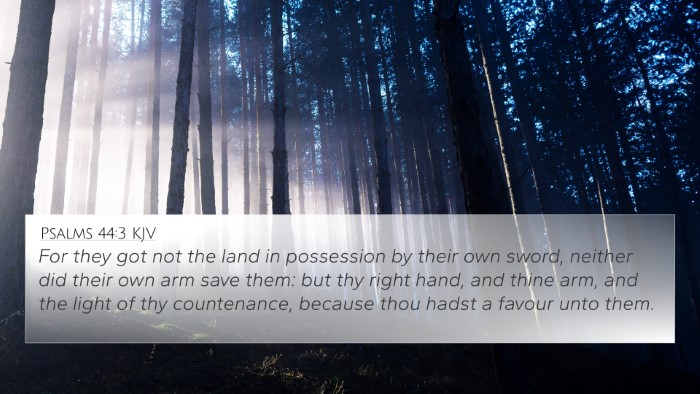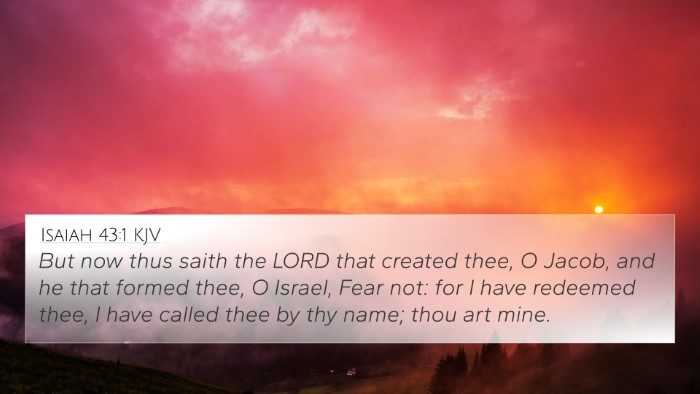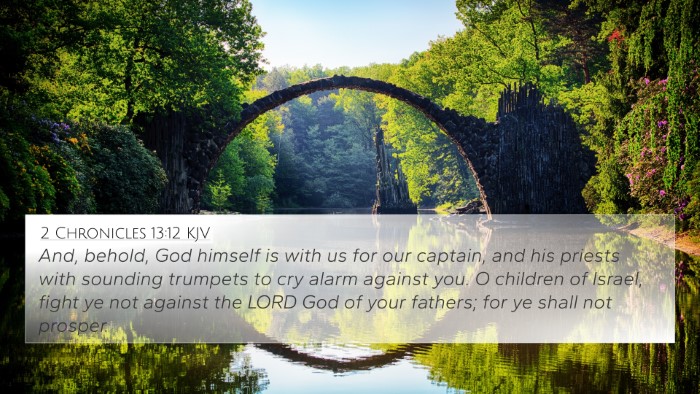Understanding Deuteronomy 3:22
Verse Reference: Deuteronomy 3:22 - "Ye shall not fear them: for the Lord your God he shall fight for you."
Summary of Meaning
Deuteronomy 3:22 conveys a profound message about trusting in God's power and protection. This verse is part of a broader narrative in which Moses addresses the Israelites, reminding them of God's unwavering help as they prepare to enter the Promised Land.
Insights from Commentaries
-
Matthew Henry:
Henry emphasizes God's providence, encouraging believers to place their confidence in the divine. He interprets the exhortation not to fear as a call to faith, indicating that God's might will be evident in their battles.
-
Albert Barnes:
Barnes connects this verse with the historical context of Israel's conquest, highlighting God's promises and previous victories as evidence of His faithfulness. He suggests that remembering past triumphs can bolster faith against future fears.
-
Adam Clarke:
Clarke focuses on the theological implications of God's protection. He argues that this assurance serves as a reminder of God's covenant with Israel and His role as a warrior on their behalf.
Connections and Cross-References
This verse can be linked to various other scriptures that reinforce the themes of divine protection and strength. Here are some significant cross-references:
- Exodus 14:14: "The Lord shall fight for you, and ye shall hold your peace." This verse echoes the promise of God's defense.
- Isaiah 41:10: "Fear thou not; for I am with thee: be not dismayed; for I am thy God." This passage provides reassurance of God's presence and support.
- Psalm 44:3: "For they got not the land in possession by their own sword, neither did their own arm save them: but thy right hand, and thine arm, and the light of thy countenance, because thou hadst a favor unto them." This highlights the importance of God's intervention in giving victory.
- Joshua 10:25: "And Joshua said unto them, Fear not, nor be dismayed: be strong and of good courage: for thus shall the Lord do to all your enemies against whom ye fight." This verse reiterates the encouragement provided to the Israelites.
- Romans 8:31: "What shall we then say to these things? If God be for us, who can be against us?" This New Testament affirmation mirrors the Old Testament assurances found in Deuteronomy.
- 2 Chronicles 20:15: "Thus saith the Lord unto you, Be not afraid nor dismayed by reason of this great multitude; for the battle is not yours, but God's." This demonstrates a consistent theme across the Scriptures regarding God's involvement in battles.
- Hebrews 13:6: "So that we may boldly say, The Lord is my helper, and I will not fear what man shall do unto me." This verse provides a reflection of the themes present in Deuteronomy 3:22.
Theological Themes and Applications
The central theme of Deuteronomy 3:22 is about God’s active participation in the lives of His people. Several theological applications can be derived from this verse:
- God's Sovereignty: The verse emphasizes that God is in control and His might surpasses human limitations.
- Faith over Fear: It encourages believers to face challenges without fear, knowing that God fights on their behalf.
- Divine Assistance: The assurance that God’s power is available to believers today as it was for the Israelites.
How to Use Cross-References for Deeper Understanding
Engaging with cross-references can deepen understanding of biblical texts:
- Identify themes: Look for common themes in the verses that relate, such as protection and divine warfare.
- Contextual analysis: Examine the context of each verse to see the circumstances under which God was speaking to His people.
- Thematic studies: Use a Bible concordance to find other passages that address similar themes or situations.
- Comparative analysis: Analyze how different authors convey the same message or theme in varied contexts.
- Sermon preparation: Utilize these cross-references to build sermons or lessons that explore God's consistent message of support and strength.
Conclusion
In summary, Deuteronomy 3:22 serves as a powerful reminder of God's commitment to fight for His people. The insights drawn from public domain commentaries underscore the relevance of this verse in both historical and contemporary contexts. Whether facing spiritual battles or life's challenges, believers can take solace in the knowledge that God's might is always at their side, echoing through both the Old and New Testaments.












